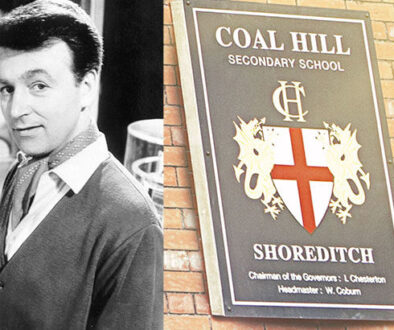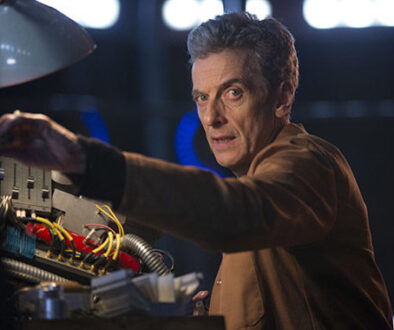The Caretaker Review
Clint Hassell gives his verdict on the sixth episode of Series 8.

A Gareth Roberts plot often introduces a tiny bit of sci-fi weirdness into an otherwise normal situation. In his many scripts for The Sarah Jane Adventures, this is done for budgetary reasons; however, this practice turns Doctor Who into a workplace comedy. “The Caretaker” – which borrows heavily from Roberts’ previous “The Lodger” and “Closing Time,” and from Chris Chibnall’s “The Power of Three” – continues the annual tradition of a humorous episode where the Doctor tries to fit into human society. Examining the alien nature of the Doctor as compared to a mundane Earth setting is a reversal for a series that usually places a British girl in a wildly exotic environment and watches for her reaction. What makes “The Caretaker” unique is its position in a series that already focuses heavily on the incongruity of this new Doctor, freeing Roberts to concentrate on Clara and Danny, and how their otherwise normal relationship is affected by the Doctor’s frequent house calls.
More interestingly, “The Caretaker” revisits ideas previously presented within the series’ narrative, though now with a decidedly different outcome. For example, the teaser of “The Caretaker” plays like a more-realized version of the opening of “The Power of Three,” only this time, instead of flashbacks and an esoteric, teatime conversation between the Ponds, the episode begins with a stylized montage of Clara struggling to juggle conflicting aspects of her life. The intro is impressive, not just for its use of visual match cuts, but for its thematic ones as well. Just as the Doctor yells, “Don’t you hate soldiers?” the shot cuts to Clara opening the door to find Danny, unfortunately there for a morning jog and unaware that she has just been chased through winding corridors by a laser-wielding armada.
Another revisited idea is that of Courtney Woods, who practically barges her way into the TARDIS at the exact moment the Doctor considers that Clara might actually retire as a companion – a different angle on the typical “the Doctor is sad when companions leave him.”
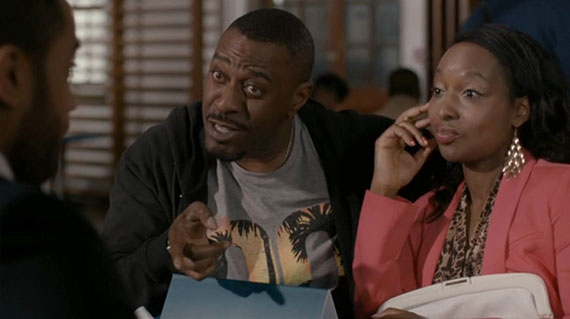
Further, Roberts examines the idea – last visited this blatantly in “The Stolen Earth”/“Journey’s End” – that the Doctor weaponizes his companions, making soldiers out of them. In “The Caretaker,” instead of the Doctor being horrified by this discovery, a former soldier realizes the effect the Oncoming Storm has had on Clara. “I know men like him,” Danny states, “They push you, make you stronger, ‘til you’re doing things you never thought you could. I saw you tonight; you did exactly what he told you. You weren’t even scared. And you should have been.” Doctor Who has always painted the companions as special because they rise to the occasion in the face of adversity; perhaps, it is that the Doctor trains them to be exemplary – that he doesn’t pick them ready-made, but selects those with potential?
The Ponds had outgrown traveling with their childish Raggedy Doctor, and left to lead adult lives. Clara, having never traveled full-time with the Doctor, is less inclined to give up her adventuring for a “normal” existence. Neither in love with the Doctor, nor avoiding her reservations about Danny, Clara escapes in the TARDIS to see the wonders of the cosmos, an acknowledgement that develops part of her character unseen since “The Rings of Akhaten.”

Again, Clara is shown to be resourceful with words as she deduces that Coal Hill School is in danger, because the Doctor hasn’t told her anything of his plan to stop the intruding alien. Why hasn’t he? He knows she won’t approve . . . because it puts the school in danger!
Further, both the Doctor and Clara are shown to be able to close the TARDIS doors with a snap – a nice bit of continuity that portrays the characters as on more-equal footing than any other modern-day Doctor/companion pairing. It’s obvious that Doctor Who has become quite Clara-centric when her merely trying to traverse a crowded hallway becomes the de facto action sequence of the first act. A recurring comment among fans is that, as Clara has taken so much of the focus, the show should be renamed Clara Who. Considering that was her storyline for all of Series 7, there is some truth to the joke. It’s perfectly fine for the companion to be the focus – it’s a long-established tradition that the Doctor’s associates are the characters with which the audience is supposed to identify – provided the companion is layered, and not merely a plot device or a cardboard cutout. Thankfully, in “The Caretaker,” Clara is neither. Is calling her “inconsistently well-written” viewing the glass as half-full?
With the focus of “The Caretaker” on the Doctor meeting Danny and how that puts Clara in the middle, the enemy is totally secondary. This threat of the Skovox Blitzer is so minor that the episode’s relatively quick resolution seems logical. This differs from “The Power of Three,” which creates such a large-scale menace that, when the episode focuses on intimate character moments and not on plot resolution, the audience feels cheated.

For someone as brilliant as the Doctor to not grasp that a former soldier now teaches math is unrealistic, leading the viewer to suspect a more abstract motive. While on the surface, the Doctor’s humorous retorts seem scripted to highlight both his alien nature and newfound prejudice, there is evidence that he willfully misunderstands, perhaps as a way to insult Danny. While several past incarnations of the Doctor might have taken that passive-aggressive route – One, Four, Six, perhaps – others, like Ten, would never have done that. Twelve may be an amazing man, but he’s no gentleman.
Further, the Doctor later accuses Clara of making a “boyfriend error.” So used to everyone deferring to his genius, the Doctor is surprised when his companion doesn’t come to the same conclusion. The Time Lord demands that Clara “explain him to me,” as if the Doctor deserves a justification. “The Caretaker” does not always paint the Doctor in the best light.
Finally, it’s weird that the Doctor denounces the “P.E. teachers” of the world as soldiers who’d rush to shoot at the Skovox Blitzer, yet makes no mention of UNIT, which probably would be what dealt with the alien threat. It’ll be interesting to see how the Doctor reacts to the soldiers of UNIT, at the end of Series 8.
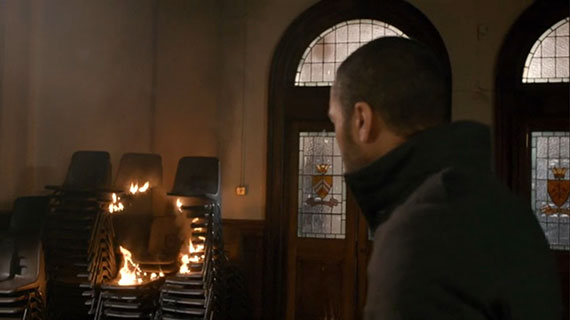
Another side effect of “The Caretaker” revisiting differently previous themes is that Danny’s behavior does not seem organic. It is understandable that he takes the revelation of Clara’s double life rather badly, but his reaction feels harsher than it should. Part of this is due to the writing, which amps up the drama for the viewing audience; however, it is also a byproduct of the structure of Series 8, and this episode’s placement within it. In the previous episode, “Time Heist,” Danny states that he and Clara are planning their second date. Though “The Caretaker” takes place at some undisclosed point further in their relationship, having been given only a short montage of their dating life, it’s difficult for the viewer to reconcile Danny’s feelings of betrayal with what feels like an incredibly new romance. Why can’t he just accept that she didn’t tell him the truth because she thought he’d freak out? Instead of reacting like, “Wow, I can’t compete with a time-traveling alien,” (because, really, how does one compare a seafood dinner with meeting fish people?) or worrying that his girlfriend may be in danger (Danny seems less fazed that the Doctor uses Clara as a decoy than that she is a willing participant), Danny focuses on Clara’s withholding her secret life from him, basically calling her two-faced. Not to say that a betrayal of trust isn’t distressing, however, “The Caretaker” seems more focused on not having Danny react to Clara in a manner similar to Mickey, in “Boom Town.” Note also that the episode refuses to cast Danny as Rory, complacent to follow Amy onto the TARDIS.

The incongruous behavior of both the Doctor and Danny causes the fight between the two to seem especially petty. The Doctor has never objected to Clara’s part-time companionship, so only his prejudice against Danny comes through. Danny, on the other hand, does have a reason to be jealous or to feel outclassed, yet, he reacts more to Clara’s hiding her double life by blaming the Doctor (who, in fairness, has treated Danny poorly). Inventing a reason for the Doctor to not like Danny, skews Danny real reason for not liking the Doctor into something less organic. While the actual dialogue and the acting are acceptable, the emotional impetus feels feigned, and neither character is likeable. Why, aside from the chance to travel in time and space, does Clara put up with it at all?
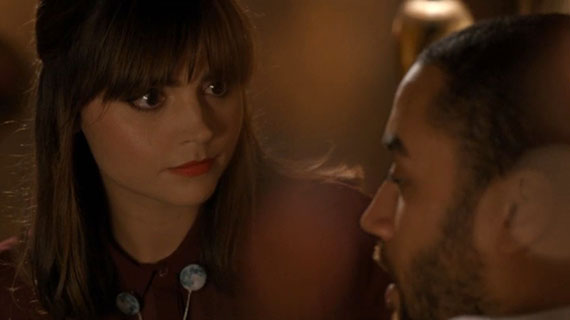
The end of Danny and Clara as a couple may be approaching far sooner than expected, as their final conversation portends:
Danny: “If he ever pushes you too far, I want you to tell me, . . . yeah?”
Clara: (casually, unaware that she’s lying) “Yeah, it’s a deal.”
Danny: “No, it’s a promise.”
Clara: “OK, I ‘promise.’”
Danny: “And if you break that promise, then we’re finished.”
Ultimatums never have a positive influence on budding relationships – not in real life, and especially not on television. Much has been made of the “life-changing” decision the Doctor forces Clara to make, in next week’s “Kill the Moon”; could part of the fallout from that dilemma be that she breaks her promise to Danny as early as the very next episode?




